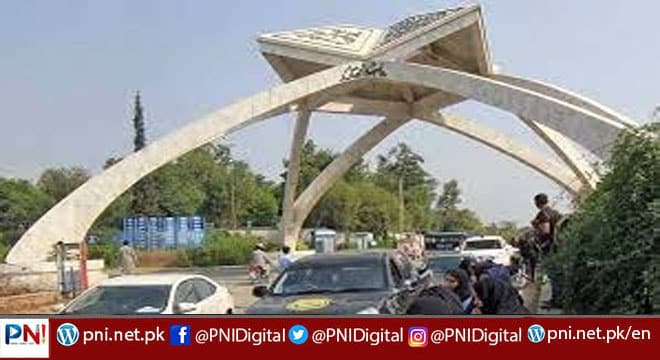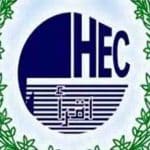Islamabad-November 28(Online): Facing mounting criticism over deteriorating administrative and academic situation at the Quaid-e-Azam University, its Vice Chancellor Dr Muhammad Ali Shah is seeking exit a year before the end of his tenure, through his candidature forthe post of VC at 3 regional public sector universities in Punjab.
The QAU is a difficult university to manage, with an assertive faculty and students who come from all parts of the country due to admission on quota basis. In 2020 also, the incumbent VChad tried to leave QAU and seek job in the provincial higher education sector. But he was refused NOC by the Federal Ministry of Higher Education and Professional Training, and asked to complete the remaining tenure at QAU.
“No substantive reforms of any part of the QAU setup have been contemplated, let alone enacted, over the past three years,” states the flyer issued by a panel of the faculty contesting the Academic Staff Association (ASA) elections on Tuesday.
The ASA is expected to proactively work to tackle the current university crisis. This creates an unnerving situation for the incumbent VC in his last year,and a probable reason for his hasty flight.
Earlier this month, the Senate Standing Committee on Federal Education and Professional Traininghad also expressed its disappointment on the serious decline of academic standards at QAU and 31 other public sector universities in the view of the Higher Education Commission. Of particular concern is the recent report by an international agency, Retraction Watch, about several instances of plagiarism in journal articles, including at QAU. A Senate sub-committee is assigned the task to investigate the matter and file its report in two months.
The QAU faculty is particularly annoyed with the university administration for its inaction against the violent activities of student ethnic councils. Last month, the members of Pashtun Council and Seraiki Council, including those residing illegally in hostels, ransacked IT facilities and faculty offices, causing a loss of over Rs.60 million to the university exchequer. They staged a strike, closing down the campus as well as access to the faculty housing. When the QAU administration failed to act, including in seeking emergency help from the Islamabad Capital Territory (ICT) Administration, the faculty was compelled to remove the barricades set up by the rowdy students, thus resuming the academic activities during the current semester.
The University Disciplinary Committee decided to rusticate some of these students, but the Vice Chancellor Office later chose to appease these students by creating the “Appeals Committee” without the mandatory approval of the Syndicate.“Over the past 3 years, the security and discipline situation has deteriorated to the point where the faculty and staff are not safe in their offices, labs, and even in on-campus homes,” states the flyer issued by the ASA panel headed by Dr Ilhan Niaz, Associate Professor at History Department.
The incumbent Vice Chancellor is under scrutiny for his own confessions about the encroachment of 700 acres of university land made before the National Assembly Standing Committee on Federal Education and Professional Training and about the open sale of drugs on campus huts made before the Senate Standing Committee on Narcotics Control.
The QAU administration has done nothing to enforce the Supreme Court’s 2017 decision to seek the help of the Capital Development Authority in vacating the previously grabbed land from illegal encroachers. Its lack of action in the past three years has resulted in more university land falling into the hands of illegal occupants:700 acres out of over 1,700 acres as admitted by the VC before the National Assembly’s (NA) Standing Committee on Federal Education and Professional Training in August.
The University has also seen its financial condition deteriorate during the same period, with budgetary deficit currently standing at Rs.800 million, as per the VC’s recent press statement. The development work on the PC1 worth over $2 billion approved by the Federal Government during the tenure of former Vice Chancellor Dr Javed Ashraf in 2018 has also been slow and uneven.
Several other issues of grave administrative and academic mismanagement are also being debated during the ASA election campaign. For example, around 70 TTS faculty members who converted from BPS with the express guarantee that their pensions were protected lost that protection in a controversial decision by the Syndicate in January 2019, with retrospective and adverse effect. BPS faculty members have also seen their promotion prospects evaporate due to lack of senior budgeted posts and their incentives are in arrears since 2017.
Moreover, the University has functioned without a regular Controller, Treasurer and Registrar in the past three years. A handful of faculty members have worked on these core positions on ad hoc basis, or are appointed on different committees.
This patronage culture has also resulted in rampant instances of irregularities in appointment and promotion of the teaching faculty and the administrative staff. In one instance, documents made public by a senior faculty of Biological Sciences reveal that the incumbent VC is trying to prematurely push through the already controversial promotion case of Academic Director, his righthand man, for endorsement as Professor by the HEC.
Follow the PNI Facebook page for the latest news and updates.








